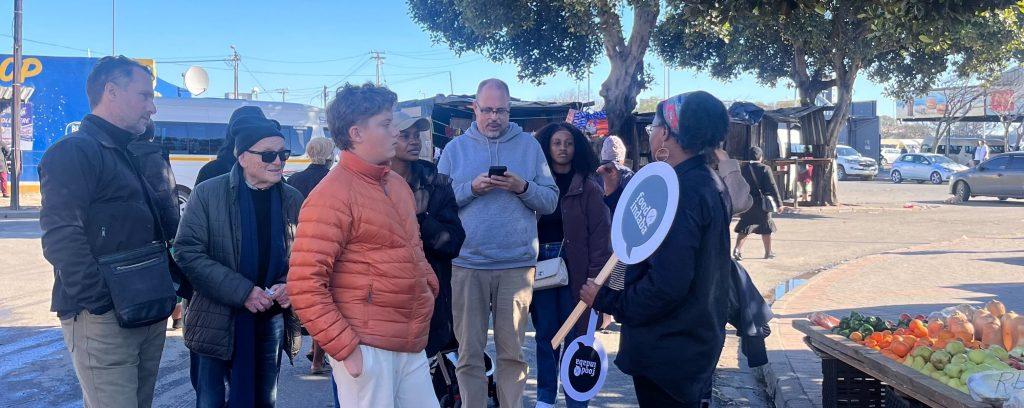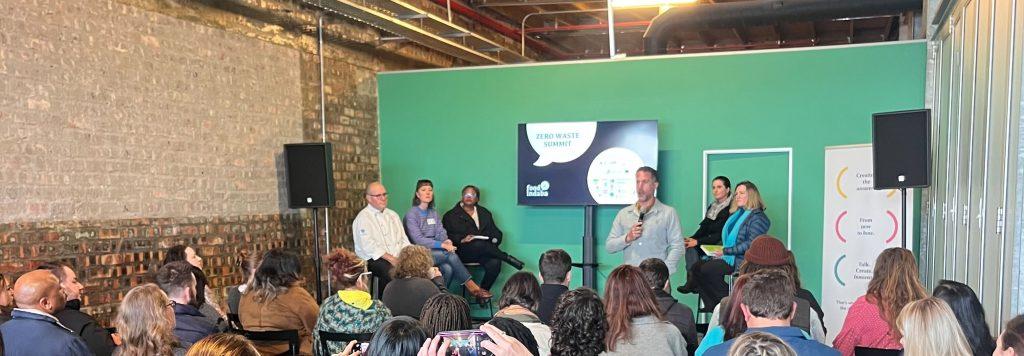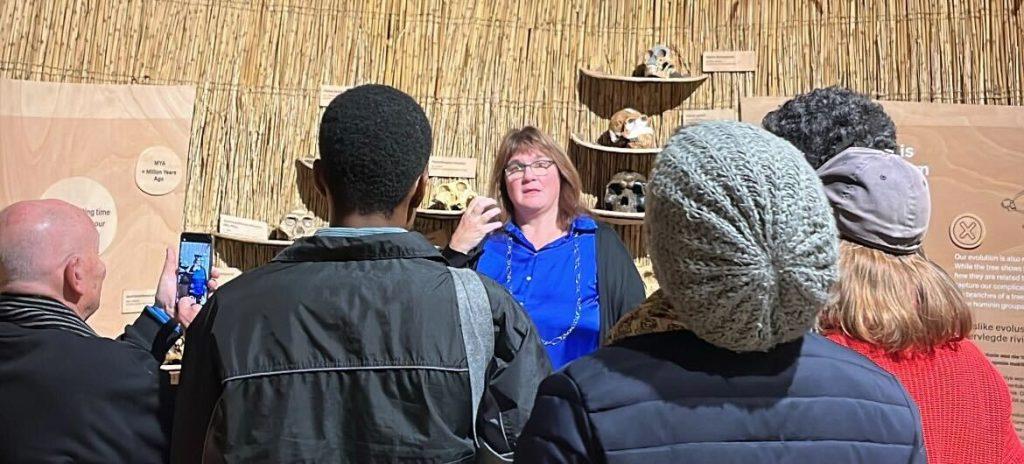The 2025 edition of Food Indaba opened with a bold and timely theme: “AI and the Food System.” This year, the programme investigates the role of artificial intelligence in shaping the future of food, raising important questions about whose knowledge is preserved, who benefits from innovation, and how AI can be used to strengthen, rather than erase, African food systems.
Now at the halfway point, Food Indaba 2025 has already delivered a wide range of educational, sensory, and deeply reflective events across Cape Town. From walking tours and food science labs to panel discussions and dining events, the first half of the programme offered participants a chance to think critically, explore new perspectives, and connect with people working at the frontlines of food system change.
Highlights So Far
Walking Tours Across the City
The festival began with a series of immersive walking tours, designed to uncover the complexity of Cape Town’s food ecosystems. In Bellville, participants explored the inner workings of one of the city’s largest informal food markets and followed the journey of food and waste from the taxi rank to a local urban farm. The Cape Town Food Systems Tour, curated with historian Andrew Boraine, traced food pathways through the city centre, revealing how colonial infrastructure, trade, and migration continue to shape how and what we eat.
In Langa, participants walked through a vibrant township food economy, engaging with traders, sampling local specialities, and learning how spatial politics and policy affect livelihoods. The tours revealed the deep intelligence embedded in informal systems and the importance of protecting local food knowledge as the city evolves.
Food, Data, and Power – The Online Conference
The online session brought together African researchers to explore how AI and data are reshaping food systems. The discussion highlighted the need for African-led approaches, ethical data use, and tech that reflects values like ubuntu and food justice.
AI Meets Food Culture
The theme came to life through a series of talks and labs, including the Hack the Kitchen: Flavour Science Lab for kids, where children learned to extract flavours from indigenous South African plants to make their own ice cream. This workshop sparked curiosity and appreciation for food science through fun, hands-on experimentation.
Other events like the Zero Waste Summit helped translate big ideas into practical tools, sparking critical discussions on how Cape Town can radically reduce food waste. From household behaviour change to city-wide systems thinking, the summit challenged us to reimagine what waste means, and how to design it out of our food future.
Food as Knowledge System
Other standout moments included Ancestral Intelligence, a fungi-focused dining experience exploring mushrooms as technologies of survival, and a private tour of the HUMANITY exhibition at the Iziko Museum with Dr Wendy Black, which reframed human evolution through a food lens. Between the Lines at The Book Lounge offered a conversation with author Kim Bagley on food writing, identity, and culture.
What’s Still to Come
As we move into the second half of Food Indaba 2025, the programme continues to explore the many ways AI and food intersect, with a fresh round of events that are hands-on, thought-provoking, and grounded in community practice.
Tea with a Farmer
On Saturday, 19 July, Food Indaba invites you to visit two inspiring urban farms:
- At Oranjezicht City Farm, manager Melanie Stewart hosts a guided tour covering the farm’s origins, ecological practices, and role in the local food system.
- In Langa, farmer Mzi Mashicila opens the gates to 16 on Lerotholi Farm, where guests will learn about the SAUFFT Agrihub pilot project and how urban farming is being integrated with art, heritage, and innovation.
Each event includes a welcome cup of herbal tea and a chance to reflect on what sustainable, community-rooted food futures can look like.
Upcoming Walking Tours
There are three more opportunities to join the popular Food Indaba walking tours:
- Langa Food Systems Walking Tour – Tuesday, 15 July
A deep dive into policy, trade, identity, and local economies within one of Cape Town’s most historic townships.- Cape Town Food Systems Walking Tour – Saturday, 19 July
A loop through the city’s food history, from pre-colonial times to the present, including tastings and historical insights.- Bellville Food Systems Walking Tour – Saturday, 19 July
Explore the Pan-African market ecosystem, food waste journey, and the informal economy that feeds much of the city.AI and the Food System Conference
On Friday, 18 July, the AI and the Food System Conference at Makers Landing brings together leading researchers, technologists, and food system thinkers. This full-day event explores how AI is already shaping agriculture, logistics, nutrition, and food access across Africa, and what we need to do to ensure these shifts are equitable and just. Lunch and coffee are included.
Hack the Kitchen (Kids & Teens)
Saturday, 19 July brings a second round of the Hack the Kitchen: Flavour Science Lab for kids aged 6–12 at the Cape Town Science Centre.
On the same day, tech-savvy teens can join the AI Cooking Jam at Food Jams Studio in Salt River. Using AI tools and a pantry of local ingredients, participants will create original recipes, cook together, and reflect on the role of technology in food innovation. It’s a perfect mix of fun and critical learning.
The Glocal Table – Dialogues Through Food
Finally, cap off the week on Saturday night, 19 July, with The Glocal Table at Makers Landing. This six-course dining experience traces the story of how “global” ingredients, like tomatoes, maize, and chillies, became local staples across Africa. Through food and storytelling, this event explores the deep cultural and historical roots of what we eat today.
Whether you’re a curious eater, urban farmer, policymaker, or tech enthusiast, there’s something left for you in the days ahead. Don’t miss your chance to walk, taste, ask questions, and engage.
Spaces are limited, book your tickets now and be part of shaping the future of food in Afica.



